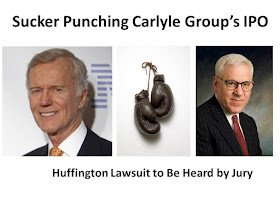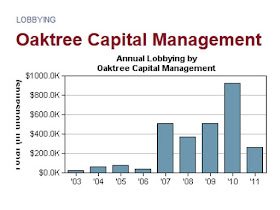UNITED STATES SECURITIES AND
EXCHANGE COMMISSION
Washington, D.C.
20549
Amendment No. 7
to
Form S-1
REGISTRATION STATEMENT
UNDER
THE SECURITIES ACT OF 1933
The Carlyle Group
L.P.
(Exact name of Registrant as
specified in its charter)
From time to time we are involved in various legal proceedings,
lawsuits and claims incidental to the conduct of our business.
Our businesses are also subject to extensive regulation, which
may result in regulatory proceedings against us.
In September 2006 and March 2009, we received requests for
certain documents and other information from the Antitrust
Division of the DOJ in connection with the DOJ’s
investigation of alternative asset management firms to determine
whether they have engaged in conduct prohibited by
U.S. antitrust laws. We have fully cooperated with the
DOJ’s investigation. There can be no
170
Table of Contents
assurance as to the direction this inquiry may take in the
future or whether it will have an adverse impact on the private
equity industry in some unforeseen way.
On February 14, 2008, a private
class-action
lawsuit challenging “club” bids and other alleged
anti-competitive business practices was filed in the
U.S. District Court for the District of Massachusetts.
(Police and Fire Retirement System of the City of
Detroit v. Apollo Global Management, LLC). The
complaint alleges, among other things, that certain alternative
asset management firms, including Carlyle, violated
Section 1 of the Sherman Act by, among other things,
forming multi-sponsor consortiums for the purpose of bidding
collectively in certain going private transactions, which the
plaintiffs allege constitutes a “conspiracy in restraint of
trade.” The plaintiffs seek damages as provided for in
Section 4 of the Clayton Act and an injunction against such
conduct in restraint of trade in the future. While Carlyle
believes the lawsuit is without merit and is contesting it
vigorously, it is difficult to determine what impact, if any,
this litigation (and any future related litigation), together
with any increased governmental scrutiny or regulatory
initiatives, will have on the private equity industry generally
or on Carlyle.
Along with many other companies and individuals in the financial
sector, Carlyle and one of our funds, CMP I, are named as
defendants in Foy v. Austin Capital, a case filed in
June 2009, pending in the State of New Mexico’s First
Judicial District Court, County of Santa Fe, which purports to
be a qui tam suit on behalf of the State of New Mexico.
The suit alleges that investment decisions by New Mexico public
investment funds were improperly influenced by campaign
contributions and payments to politically connected placement
agents. The plaintiffs seek, among other things, actual damages,
actual damages for lost income, rescission of the investment
transactions described in the complaint and disgorgement of all
fees received. In May 2011, the Attorney General of New Mexico
moved to dismiss certain defendants including Carlyle and
CMP I on the ground that separate civil litigation by the
Attorney General is a more effective means to seek recovery for
the State from these defendants. The Attorney General has
brought two civil actions against certain of those defendants,
not including the Carlyle defendants. The Attorney General has
stated that its investigation is continuing and it may bring
additional civil actions. We are currently unable to anticipate
when the litigation will conclude, or what impact the litigation
may have on us.
In July 2009, a former shareholder of Carlyle Capital
Corporation Limited (“CCC”), claiming to have lost
$20.0 million, filed a claim against CCC, Carlyle and
certain of our affiliates and one of our officers (Huffington
v. TC Group L.L.C. et al.) alleging violations of
Massachusetts “blue sky” law provisions and related
claims involving material misrepresentations and omissions
allegedly made during and after the marketing of CCC. The
plaintiff seeks treble damages, interest, expenses and
attorney’s fees and to have the subscription agreement
deemed null and void and a full refund of the investment. In
March 2010, the United States District Court for the District of
Massachusetts dismissed the plaintiff’s complaint on the
grounds that it should have been filed in Delaware instead of
Massachusetts, and the plaintiff subsequently filed a notice of
appeal to the United States Court of Appeals for the First
Circuit. The plaintiff has lost his appeal to the First Circuit
and has filed a new claim in Delaware state court. Defendants
are awaiting a ruling on a motion for summary judgment. The
defendants are vigorously contesting all claims asserted by the
plaintiff.
In November 2009, another CCC investor instituted legal
proceedings on similar grounds in Kuwait’s Court of First
Instance (National Industries Group v. Carlyle
Group) seeking to recover losses incurred in connection with
an investment in CCC. In July 2011, the Delaware Court of
Chancery issued a decision restraining the plaintiff from
proceeding in Kuwait against either Carlyle Investment
Management L.L.C. or TC Group, L.L.C., based on the forum
selection clause in the plaintiff’s subscription agreement,
which provided for exclusive jurisdiction in Delaware courts. In
September 2011, the plaintiff reissued its complaint in Kuwait
naming CCC only, but, in December 2011, expressed an intent to
reissue its complaint joining Carlyle Investment Management
L.L.C. as a defendant. We believe these claims are without merit
and intend to vigorously contest all such allegations.
The Guernsey liquidators who took control of CCC in March 2008
filed four suits in July 2010 against Carlyle, certain of its
affiliates and the former directors of CCC in the Delaware
Chancery Court,
171
Table of Contents
the Royal Court of Guernsey, the Superior Court of the District
of Columbia and the Supreme Court of New York, New York County,
(Carlyle Capital Corporation Limited v. Conway et
al.) seeking $1.0 billion in damages. They allege that
Carlyle and the CCC board of directors were negligent, grossly
negligent or willfully mismanaged the CCC investment program and
breached certain fiduciary duties allegedly owed to CCC and its
shareholders. The Liquidators further allege (among other
things) that the directors and Carlyle put the interests of
Carlyle ahead of the interests of CCC and its shareholders and
gave priority to preserving and enhancing Carlyle’s
reputation and its “brand” over the best interests of
CCC. The defendants filed a comprehensive motion to dismiss in
Delaware in October 2010. In December 2010, the Liquidators
dismissed the complaint in Delaware voluntarily and without
prejudice and expressed an intent to proceed against the
defendants in Guernsey. Carlyle filed an action in Delaware
seeking an injunction against the Liquidators to preclude them
from proceeding in Guernsey in violation of a Delaware exclusive
jurisdiction clause contained in the investment management
agreement. In July 2011, the Royal Court of Guernsey held that
the case should be litigated in Delaware pursuant to the
exclusive jurisdiction clause. That ruling was appealed by the
Liquidators, and in February 2012 was reversed by the Guernsey
Court of Appeal, which held that the case should proceed in
Guernsey. Carlyle intends to seek review of that ruling
pursuant to an application for special leave to the Privy
Council. Carlyle will also request a stay of further
proceedings, pending consideration of the appeal application,
from the Privy Council. Also, in October 2011, the plaintiffs
obtained an ex parte anti-anti-suit injunction in
Guernsey against Carlyle’s anti-suit claim in Delaware.
That ruling has been affirmed by the Guernsey Court of Appeal,
although a written judgment has not yet been released. Carlyle
anticipates that it will seek a further appeal before the Privy
Council on the anti-anti-suit injunction order. The
Liquidators’ lawsuits in New York and the District of
Columbia were dismissed in December 2011 without prejudice. We
believe that regardless of where the claims are litigated they
are without merit and we will vigorously contest all
allegations. We recognized a loss of $152.3 million in 2008
in connection with the winding up of CCC.
In June 2011, August 2011, and September 2011, three putative
shareholder class actions were filed against Carlyle, certain of
our affiliates and former directors of CCC alleging that the
fund offering materials and various public disclosures were
materially misleading or omitted material information. Two of
the shareholder class actions, (Phelps v. Stomber, et
al.) and (Glaubach v. Carlyle Capital Corporation
Limited, et al.), were filed in the United States District
Court for the District of Columbia. The most recent shareholder
class action (Phelps v. Stomber, et al.) was filed
in the Supreme Court of New York, New York County and has
subsequently been removed to the United States District Court
for the Southern District of New York. The two original D.C.
cases were consolidated into one case, under the caption of
Phelps v. Stomber, and the Phelps named plaintiffs have
been designated “lead plaintiffs” by the Court. The
New York case has been transferred to the D.C. federal court and
the plaintiffs have requested that it be consolidated with the
other two D.C. actions. The defendants have opposed and have
moved to dismiss the case as duplicative. The plaintiffs in all
three cases seek all compensatory damages sustained as a result
of the alleged misrepresentations, costs and expenses, as well
as reasonable attorney fees. The defendants have filed a
comprehensive motion to dismiss. We believe the claims are
without merit and will vigorously contest all claims.
From 2007 to 2009, a Luxembourg portfolio company owned by
Carlyle Europe Real Estate Partners, L.P. (CEREP I)
received proceeds from the sale of real estate located in Paris,
France. CEREP I is a real estate fund not consolidated by us.
The relevant French tax authorities have asserted that such
portfolio company had a permanent establishment in France, and
have issued a tax assessment seeking to collect
€97.0 million, consisting of taxes, interest and
penalties. We understand that the matter has been referred to
the French Ministry of Justice, which may appoint a prosecutor
to conduct an investigation.
During 2006, CEREP I completed a reorganization of several
Italian portfolio companies. Such Italian portfolio
companies subsequently completed the sale of various properties
located in Italy. The Italian tax authorities have issued
revised income tax audit reports to various subsidiaries of
CEREP I. The tax audit reports proposed to disallow
deductions of certain capital losses claimed with respect to the
reorganization of the Italian portfolio companies. As a
result of the disallowance
172
Table of Contents
of such deductions, the audit reports proposed to increase the
aggregate amount of Italian income tax and penalties owed by
subsidiaries of CEREP I by approximately
€50.0 million. It is possible that the Italian
Ministry of Justice could appoint a prosecutor to conduct an
investigation.
CEREP I and its subsidiaries and portfolio companies are
contesting the French tax assessment and also intend to contest
the proposed Italian income tax adjustments. Settlement
opportunities are also being explored. Although neither
CEREP I nor the relevant portfolio companies is consolidated by
us, we may determine to advance amounts to such nonconsolidated
entities or otherwise incur costs to resolve such matters, in
which case we would seek to recover such advance from proceeds
of subsequent portfolio dispositions by CEREP I. The amount of
any unrecoverable costs that may be incurred by us is not
estimable at this time.








































